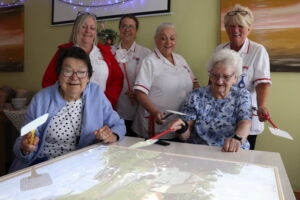Feature: ‘People will die’ under system that labels support workers unskilled
There will be a ‘human cost’ to the new points-based immigration system that considers care workers to be of less value than fruit pickers, care industry experts have warned.
Social Care Today spoke with Nicola Cromwell, one of the support workers the Home Office branded ‘unskilled’ when it announced the new system last week. And chief executive of NACAS, Karolina Gerlich, who is working to boost the public’s understanding of the important role support workers play in society.
The care sector employs around 1.6m people and has a shortage of 110,000 staff, according to the Skills for Care report published in October.
Care workers can earn as little as £16,000, according to the National Association of Care and Support Workers (NACAS), well under the £26,500 threshold that will be required for entry under the new immigration system.
While some will be ineligible for entry into the UK due to being classed as unskilled, along with fruit pickers who government bosses say will be given special dispensation under the new immigration policy to ensure supermarket shelves are stocked.
Nicola, from Ilkley, has worked in the industry for 30 years but is paid the same as someone just starting out. She works in a house with four adults with learning disabilities who she often supports by herself.
The 45-year-old has worked on retainer for Mencap for five years, having left contracted employment to protect her mental health.
‘It was making me poorly. It just got to the point where I was so mentally and physically drained I couldn’t do my job. Sickness is so high in my small team, people go off for months because they are so stressed.
‘You don’t feel like you’re being appreciated, you never get a thank you.
‘I think it has got a lot worse in the last few years. I loved my job when I was working ten years ago. Social care was a lot better then, it was before the council dropped a lot of services. We were a lot more appreciated.
‘It’s changed a lot since then. I’ve never known moral be so low. There is just no incentive to work in social care now. It’s long hours, it’s bad pay and a lot of responsibility.
‘On a sleep-in shift you’re supposed to work until 10pm at night, but that never happens.
‘You always end up staying up and doing paperwork after the shift. I’m always worried that if something happens in the night and I haven’t written it up the previous night’s notes then it’s going to fall on me. You would be in trouble if you hadn’t done your paperwork.
‘You don’t have to check on them as such, but you have to keep an ear out for people who are out of bed.
‘Some people are more independent than others, so if they are going on a night out and they don’t come home until midnight we can’t clock off until they’re back and we know the door is locked.
‘We’re supposed to start again at 7am and work until 11am when the next person comes in. But sometimes they can’t get in for whatever reason and there’s no one to cover.
‘You can’t leave the people you’re supporting on their own so you can be at work for two days.’
The human cost
Karolina Gerlich, the chief executive of NACAS, says it is ‘outrageous’ to suggest care workers are unskilled and describes the new immigration system as ‘terrifying’.
‘There is going to be a human cost to this, people are going to pay with their lives and I’m not saying that lightly.
‘People will die because there won’t be enough of us to deliver care. It’s terrifying.
‘No one is promising extra funding for social care and the only way we are going to be able to attract British workers is if we can offer them more money.
‘And the idea that care work is low skilled is outrageous. We have organisational skills, clinical skills and soft skills of empathy and patience.
‘A big part of what care workers do is providing end of life care, it’s incredibly important stressful work.
‘The government is saying the answer is to innovate, but you can’t replace care workers with tech. It’s the humanity of care workers that is important.’
Nicola said she constantly has to rely on her own initiative and that of her team to ensure her service users get the care they need.
‘We have to check the medication, make sure it gets taken at the right time, make sure it goes with them if they leave the house, make sure it’s re-ordered and delivered at the right time. Management can’t get involved.
‘Every bit of responsibility lies with the support worker. If something goes wrong it’s on you. It’s you who ends up in court, it’s you who get fired.
‘We have got on-call but it has to be life and death before you can ring them and they’re usually based somewhere like Belfast.
‘I was working one night and the kitchen ceiling collapsed literally seconds after the person I was supporting left the room.
‘It was 9pm on a Saturday night, I rang on call and they said there was nothing they could do. Trying to explain the situation to the people I support was hard enough, then I had to figure out how I was going to sort their meals.
‘If one of them need to go to hospital in the middle of the night I can’t leave the other three. I have to send them by themselves.
‘I dread to think what would happen if I got ill in the night. Who would even pick up the phone?’
Cllr James Jamieson, chairman of the Local Government Association says the immigration system reform will provide an opportunity to tackle skills gaps and workforce challenges in specific sectors such as social care.
‘Councils know their local communities and local economies best. Involving councils in the development of a new system would mean they can assess demand for skills locally, ensure it takes account of the varied needs of employers and helps the government achieve its ambition to level up all parts of the country.
‘Salary thresholds should be variable across sector and region, to reflect the needs of different employers, alongside a reformed and devolved skills and employment system to tackle the existing national skills shortages.
‘As a country, we face significant skills challenges. The social care system faces one of the most serious challenges and any reforms need to ensure the social care workforce can be maintained.’
Money being wasted
However, Nicola believes the government will need to do more if they want to solve the social care crisis.
‘There needs to be a complete overhaul of the system.
‘My attitude has always been that it would take the pressure off the NHS if they were to sort out social care because people would be looked after properly in the community and at home so it would stop unnecessary trips to the hospital and free up beds.
‘You can’t contact a social worker for love nor money. So if someone is getting too much care and is refusing support because they’d rather be out on their own you can’t tell anyone.
‘I have known people wait two years to have their care packages reviewed. There’s a lot of money being wasted.
‘The profits that some of the companies that provide care are making are obscene. They then sit on this money and claim they are going to reinvest it in services and campaigns but never seem to make much headway.
‘It needs to be better regulated by the government.’
Photo Credit – Pixabay

















